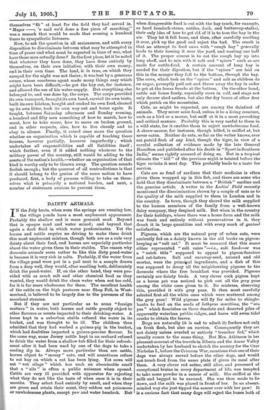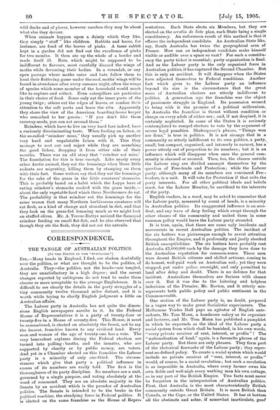But if they are not particular as to some "foreign
matters" in water, both horses and cattle greatly object to other flavours or scents imparted to their drinking-water. A horse kept in a suburban stable refused the water in its bucket, and was thought to be ill. The children then admitted that they had washed a guinea-pig in the bucket, which had doubtless imparted a guinea-porcine flavour. In the same way, some Jersey cattle kept in an orchard refused to drink the water from a shallow tub filled for their refresh- ment after it had been used by one of the dogs to take a cooling dip in. Always more particular than are cattle, horses object to " mousy " oats, and will sometimes refuse to eat hay on which a eat has been lying. Yet cows will eat "wet silage" which has such an abominable smell that a " silo " is often a public nuisance when opened. Cattle are very ill provided with apparatus for rejecting what they do not like the taste of when once it is in their months. They select food entirely by smell, and when they are green and retain their scent, they seldom eat poisonous or unwholesome plants, except yew and water hemlock. But when disagreeable food is cut with the hay (such, for example, as hard hemlock-stems, nettles, dock, and buttercup-stalks), their only idea of haw to get rid of if is to toss the hay in the air. They let it fall loose, and then, after carefully smelling it over, pick up the good and reject the bad. The result is that an attempt to feed cows with "rough hay" generally. leads to their tossing it over the yard, and wasting one half of it. The proper course is to cut the rough hay up into long chaff, and to mix with it salt and " spices " such as are made for cattle-food. A certain amount of long hay is needed for their digestion, but if the " spices " are laid on this in the manger they fall to the bottom, through the hay. The cows, which look on the " spices " and salt as children do on sugar, promptly pull out and throw away the bay in order to get at the bonne bouche at the bottom. On the other hand, cattle eat bones freely, especially cows in calf, and stags not only devour shed antlers, but also the dry bones of other deer which perish on the mountains.
Cats, as might be expected, are among the daintiest of animals. They never seize food, unless it be a living creature, such as a bird or a mouse, but sniff at it in a most provoking and critical manner. Probably this is very useful to them in a wild state, for it enables them to reject unwholesome food. A shrew-mouse, for instance, though killed, is sniffed at, but never eaten. Neither do cats, so far as the writer knows, ever eat putrid flesh of any kind, though the tiger, in view of a careful collection of evidence made by the late General Hamilton and published after his death in "Sport in Southern India," seems rightly accused of doing so. But in a tropical climate the " kill " of the previous night is tainted before the tiger revisits it next day. This probably leads to a taste for carrion.
Cats are so fond of sardines that their medicine is often given them wrapped up in this fish, and there are some who hold that they discriminate between a "British" sardine and the genuine article. A writer in the Ladies' Field recently mentioned the discrimination shown by a couple of cats as to the quality of the milk supplied to them in London and in the country. In town, though they shared the milk supplied to the human members of the family from a well-known dairy company, they despised milk. But when in the country for their holidays, where there was a home farm and the milk was fresh and entirely without preservatives in it, they drank it in large quantities and with every mark of genteel satisfaction.
Pigeons, which are the natural prey of urban cats, were anciently fed on a dainty known in the old books on pigeon. keeping as "salt cat." It must be assumed that this name either represented " salt cates "—i.e., salt food—or was a "catch title" supposed to appeal to pigeon-fanciers and cat-haters. Salt and caraway-seed, aniseed and old mortar, were the princiipal ingredients, and a dish of this was supposed to decoy all the neighbouring pigeons to the dovecote where the free breakfast was provided. Pigeons certainly are dainty birds. A very clever cock pigeon kept as a house pet was noticed to pick out all the grey peas among the white ones given to it. Its mistress, observing this, provided it with grey peas. It then most carefully selected first all the white ones which were scattered among the grey peas ! Wild pigeons will fly for miles to shingle- banks to feed on the seeds of lathyrus maritinza, the "sea pea" which flourishes on these desolate and deserted piles of apparently waterless pebble ridges, and hares will swim tidal creeks to obtain the leaves.
Dogs are naturally (it is sad to admit it) feeders not only on fresh flesh, but also on carrion. Consequently they are not dainty unless overfed or entirely "trencher fed," which usually comes to the same thing. But Mrs. Atkinson in her pleasant account of the travels in Siberia and the Amur Valley undertaken by her husband to sketch the scenery for the Czar Nicholas I., before the Crimean War, mentions that one of their dogs was always served before the other dogs, and would not touch food from the same plate if given its meal after them. A very clever red setter, still alive, and possessed of exceptional brains in every department of life, was tempted to take some powder in a saucer of milk. She sniffed at the milk and begged to be excused. She was then made to lie down, and the milk was placed i front of her. In an absent- minded way she just tipped the saucer over with her paw! It is a curious fact that many dogs will reject the bones both of
wild ducks and of plover, however careless they may be about what else they devour.
When animals happen upon a dainty which they like, they simply " stuff " like children. Rabbits and bares, for instance, are fond of the leaves of pinks. A tame rabbit kept in a garden did not find out the excellence of pinks for two months. It then ate up the whole of a border and made itself ill. Bats, which might be supposed to be indifferent to flavours, most carefully discard the wings of moths while devouring their bodies. In a verandah, or any open passage where moths enter and bats follow them to hunt their fluttering game under the roof, moths' wings will be found in abundance after every summer night, often the wings of species which some member of the household would much like to capture and collect. Even caterpillars are particular in their choice of food. Some only eat the inner parts of the young twigs ; others eat the edges of leaves, or confine their attention to the soft parts and leave the ribs. Apparently they share the view of the American boarding-house keeper who remarked to her guests : "If you don't like them caraway-seeds, you can eat around them."
Reindeer, which have to live on very hard fare indeed, have a curiously discriminating taste. When feeding on lichen, or the so-called "reindeer moss," they usually pick up another very hard and unpalatable lichen with it. This they manage to sort out and reject while they are munching the good lichen, dropping it from either side of their mouths. There was an old story that "reindeer eat mice.' The foundation for this is true enough. Like nearly every other Arctic animal, they eat the lemmings when 'these little rodents are migrating, killing them by stamping on them with their feet. Some writers say that they eat the lemmings for the sake of the grass in the little creatures' stomachs. This is probably based on a habit which the Lapps have of eating reindeer's stomachs cooked with the grass inside,— about the only vegetable food which these Northerners do eat. The probability is that reindeer eat the lemmings for the same reason that many Northern herbivorous creatures will eat flesh, as a kind of change and stimulant in diet, and that they look on the grass-fed lemming much as we might look on stuffed olives. Mr. A. Trevor-Battye noticed the Samoyed reindeer feeding on small flat-fish, and he also observed that though they ate the flesh, they did not eat the entrails.







































 Previous page
Previous page